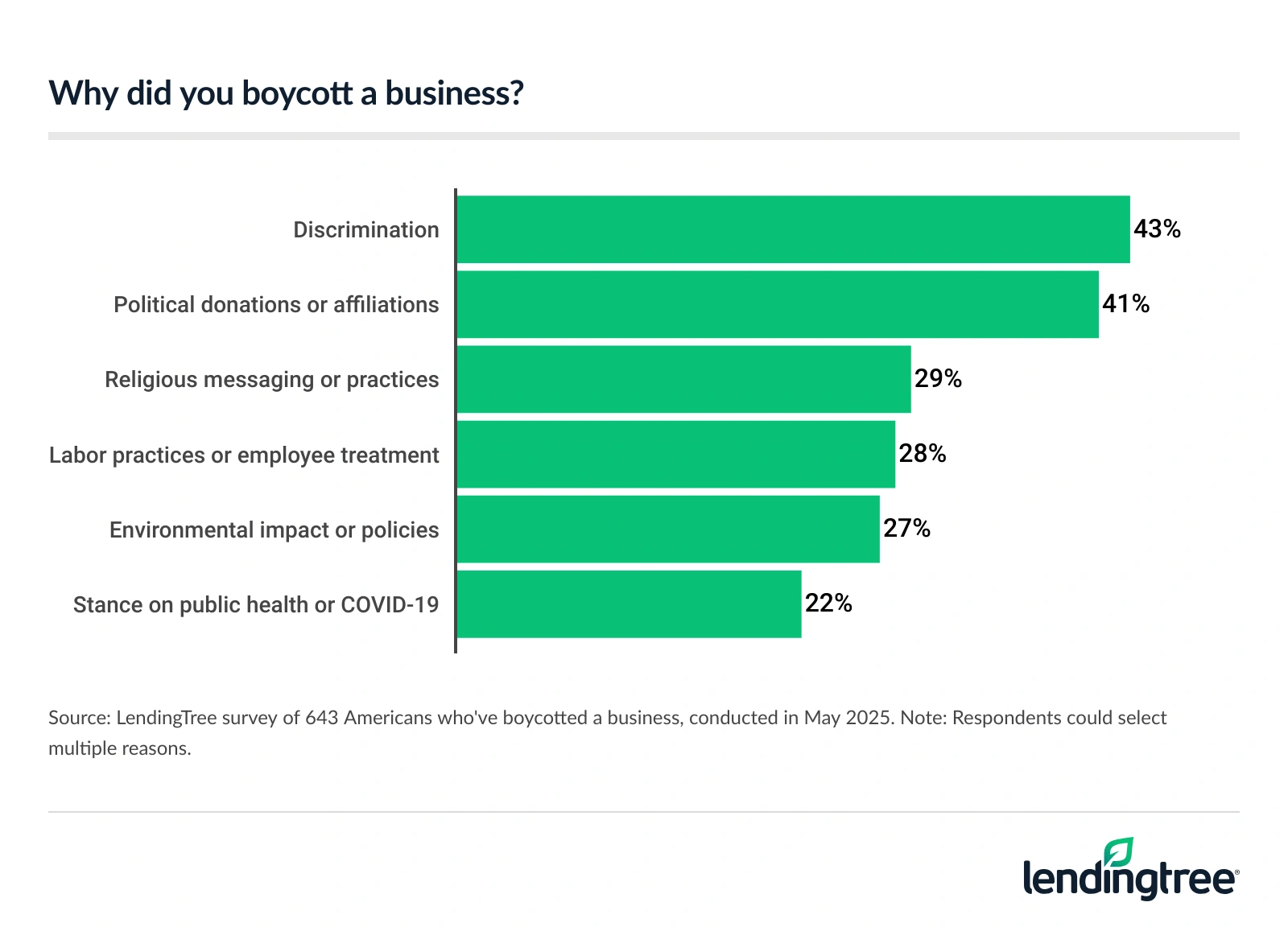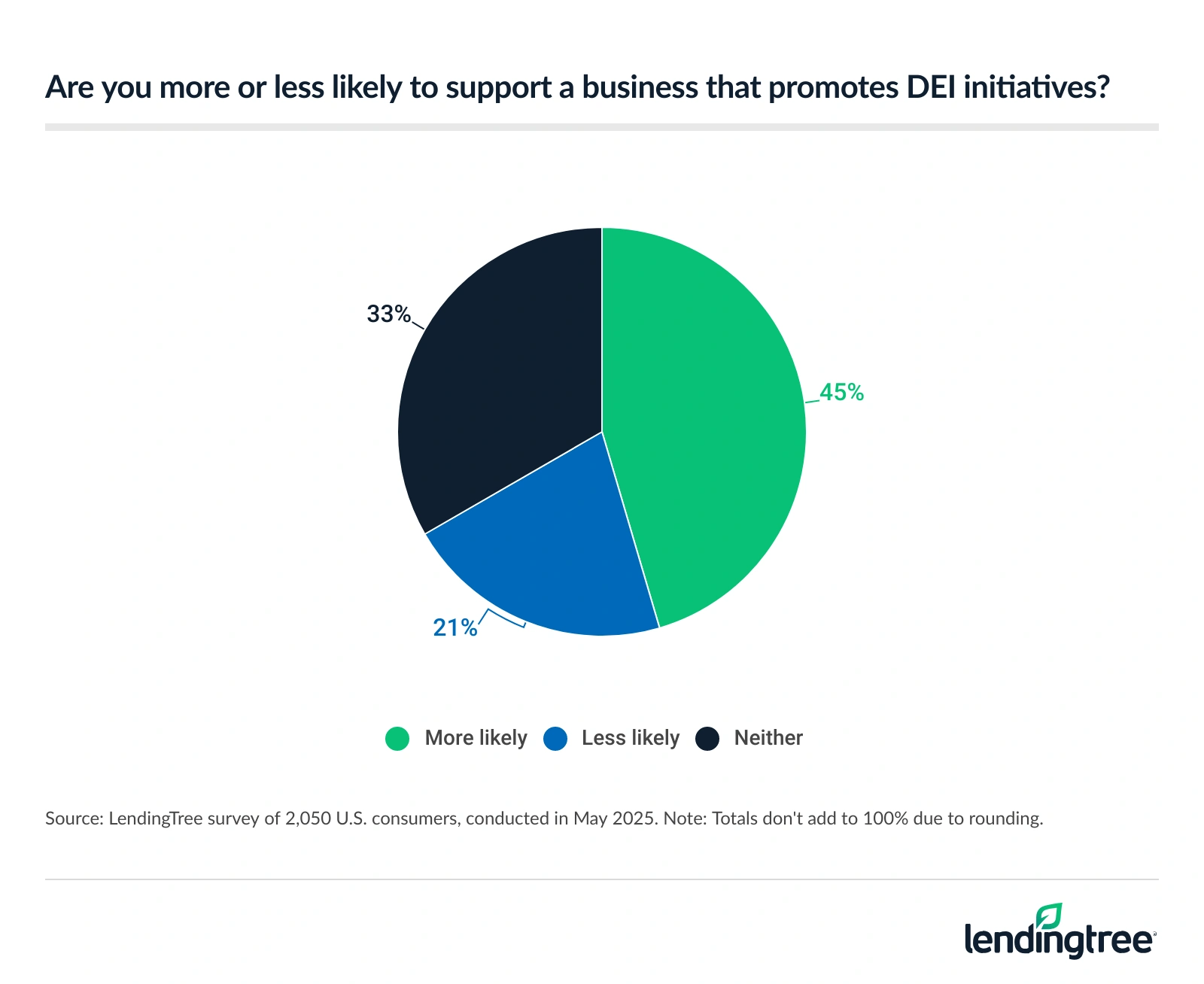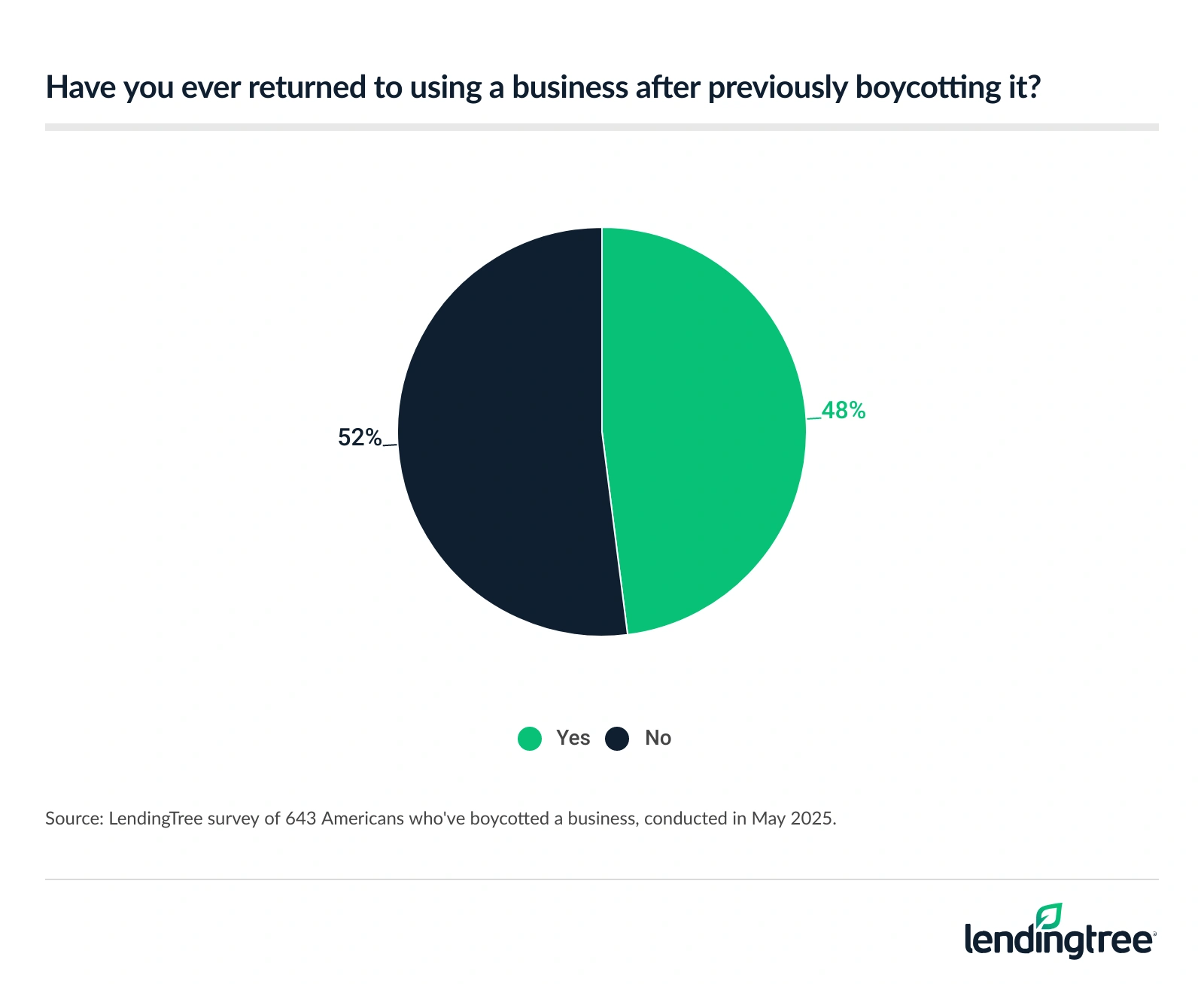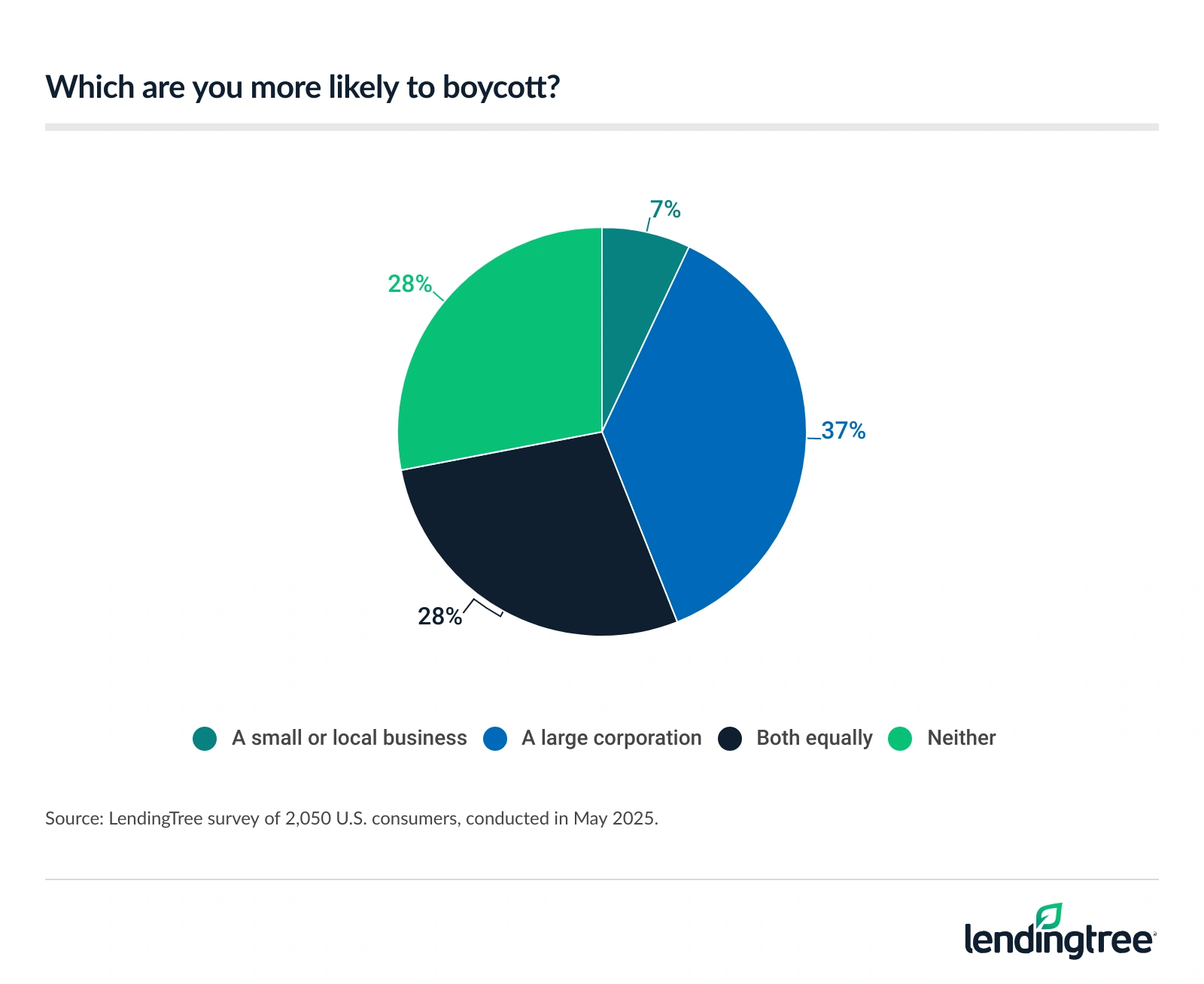Almost a Third Have Boycotted a Business, Though Many Vet Companies’ Values First
Political tensions are high, and businesses may be caught in the cross fire.
Whether driven by viral outrage or social movements, consumers are combating businesses that don’t align with their values with the most powerful weapon they have: their wallets.
According to a LendingTree survey of 2,050 U.S. consumers, 31% have boycotted a business, while 23% have supported a business specifically because it was the target of a boycott.
Here’s what else we found.
Key findings
- Consumers put their money where their mouths are. 31% of Americans have boycotted a business, citing discrimination (43%), political donations or affiliations (41%) and religious messaging or practices (29%). 45% of consumers research a business’s values or stance before purchasing at least sometimes, with 59% of Gen Zers doing so.
- Some support a business to help reverse its boycott. 23% of consumers have supported a business because it was the target of a boycott, with Republicans (31%) more likely to do so than Democrats (20%). Overall, 38% believe businesses should take public stances.
- Diversity, equity and inclusion (DEI) is divisive, especially among political parties. 45% of Americans are more likely to support a business that promotes DEI, while 21% say they’re less likely. Republicans (29%) are almost twice as likely as Democrats (16%) to say they’re less likely to support a business that promotes DEI.
- Many boycotters have changed stances, and some Americans generally feel conflicted. Almost half (48%) of boycotters have returned to a business after boycotting it. A third (33%) of all Americans admit to feeling conflicted about supporting a business that doesn’t align with their values, while 25% feel pressure from others to support or avoid certain businesses.
- Small businesses aren’t spared from boycotts. Americans are about five times as likely to boycott a large corporation (37%) than a small business (7%) — but 28% would boycott both. However, among those who’ve boycotted a business, 35% targeted a small business and 77% a corporation. Additionally, 20% of consumers have left a negative review for a small business due to a political, social or religious stance.
Many consumers boycott businesses
Americans know that every purchase is a statement, and they’re willing to walk away from some businesses.
In total, 31% of Americans have boycotted a business. Notably, those with the most to spend are also the most likely to participate in a boycott, with 43% of six-figure earners having done so.
By generation, Gen Zers ages 18 to 28 (37%) are the most likely to boycott, while Republicans (36%) are the most likely political party.
When asked why they boycotted a business, 43% cited discrimination — the most common response. Political donations or affiliations (41%) and religious messaging or practices (29%) followed.

Boycotting is common for some, as 36% of boycotters have steered clear of three or more businesses. Meanwhile, 69% of boycotters are currently boycotting at least one business.
Drilling deeper into the types of stances that influence a boycotter’s decision, a business’s stance on racial equity and civil rights (33%) is the top response. These follow:
- Abortion/reproductive rights (27%)
- LGBTQ+ rights (26%)
- Immigration policy (25%)
- Gun rights or gun control (24%)
- Religious freedom (24%)
- Climate change/environment (20%)
- Political campaign donations (19%)
- COVID-19 policies (19%)
Whether they’ve participated in a boycott, 45% of consumers research a business’s values or stance before purchasing at least sometimes. Those with children younger than 18 (63%) are the most likely to do so. Notably, Gen Zers (59%) are the most likely age group to research a business’s values or stance.
Matt Schulz — LendingTree chief consumer finance analyst and author of “Ask Questions, Save Money, Make More: How to Take Control of Your Financial Life” — says that’s significant.
“There’s no doubt that lots of Americans are aware of the political leanings of many of the businesses they frequent, but the fact that 45% of consumers look into a company’s politics before buying from them is pretty shocking,” he says. “Any company that attempts to downplay the importance of politics in their customers’ shopping choices does so at its own peril. Your potential customers are listening closely to what your business says, whether you like it or not.”
Any company that attempts to downplay the importance of politics in their customers’ shopping choices does so at its own peril.
Republicans most likely to reverse boycott
Conversely, many consumers will also go out of their way to support a business being boycotted. In fact, almost a quarter (23%) of consumers have done so, with six-figure earners (37%) the most likely group to support a boycotted business. Notably, Republicans (31%) are much more likely to do so than Democrats (20%).
Reverse boycotts may not be enough, particularly because 67% of Americans think boycotts are at least somewhat effective in influencing business practices.
All in all, 38% believe businesses should take public stances. Those with children younger than 18 (53%), Gen Zers (51%) and six-figure earners (51%) are the only groups with more than half holding this belief.
Schulz believes every company should be willing to take public stances.
“Some issues are too important to remain quiet about,” he says. “However, a company would be doing itself a disservice if it didn’t at least look into the possible impact of such a stance on its overall bottom line. A bold stance will likely make many potential customers like a business less, but it’ll also likely make others like them more. The question for the business is whether it’ll lose more customers than it gains as a result of its bold stance. If they think the answer is yes, a business is likely to think twice about speaking up. If the answer is no, they can move forward feeling even better about their move.”
Businesses’ DEI stances affect consumer support
As the presidential administration continues to push for an end to diversity programs, diversity, equity and inclusion (DEI) is a divisive topic among consumers — and it certainly affects where they shop. Across all Americans, 45% are more likely to support a business that promotes DEI, while 21% say they’re less likely.

Democrats (61%) are overwhelmingly the most likely to support a business promoting DEI. Meanwhile, 29% of Republicans say they’re less likely to do so — the highest by demographic, though not by as wide a margin.
DEI was designed to create environments where everyone feels welcomed and respected. With increased scrutiny of a business’s DEI stances and broader political stances, it may not be surprising that 31% of Americans have felt unwelcome in a business because of their personal beliefs or identity.
Almost half of boycotters eventually returned
Whether a company changes its stances, boycotts don’t last forever. In fact, 48% of boycotters have returned to a business after boycotting it. That figure rises to 70% among those with children younger than 18.

Regardless of how long it lasted, Schulz says a boycott can severely impact a company’s finances. “We’ve seen it with Bud Light and Target recently, but there are plenty of other examples over the years,” he says. “While there’s no question that plenty of people boycott companies only for a while before returning, other people have long memories. A boycott can leave a stain on a company’s brand for years, and that can be a big deal.”
Still, 33% of all Americans say they feel conflicted about supporting a business that doesn’t align with their values. And a quarter (25%) feel pressure from others to support or avoid certain businesses.
Consumers more likely to boycott big businesses
Consumers tend to be more critical of big businesses than small ones. In fact, 37% of Americans say they’d be more inclined to target a large corporation, while just 7% are more inclined to boycott small businesses. Still, another 28% would boycott both.

Schulz believes consumers are less likely to say they’d boycott small businesses because Americans have a soft spot for them.
“So many of us are entrepreneurs or have friends and loved ones who run small businesses, so we have a feel for how grueling and thankless running a small business can be,” he says. “We also know that small businesses help make one community unique from another, and we want to support that. We saw the nation rally to support small businesses during the darkest days of the pandemic, helping keep many of these businesses afloat in perhaps the toughest financial times they’ll ever see.”
When it comes down to it, though, 77% of boycotters have targeted a corporation, and a significant 35% targeted a small business — meaning small businesses aren’t necessarily spared by those taking action.
Boycotting isn’t the only way to communicate displeasure, though, as 20% of consumers have left a negative review for a small business because of a political, social or religious stance.
Taking a stand as a small business: What to keep in mind
In today’s political climate, your business’s message matters. If you’re trying to take a stance but aren’t sure how to communicate it appropriately, we offer the following advice:
- Be transparent and genuine. “Consumers have a keen sense of insincerity and deception,” Schulz says. “Taking a stand can be impactful when there’s a compelling story behind it, but people can smell when someone is taking a stance to jump on a bandwagon or drum up business.”
- Crunch the numbers. “Some stances are so important that a company is willing to embrace them regardless of the impact,” he says. “In other cases, doing some consumer research to try to understand the impact of the stance on current and potential customers can make sense. Polling, focus groups, competitor research and other data can help you make the best decision for your company.”
- Prepare for backlash, and respond thoughtfully. Even the most well-intentioned stance can provoke criticism. Have a plan for how you or your team will handle negative reactions. Respond with respect, stay true to your values and use feedback as an opportunity to continue learning and refining your message.
Methodology
LendingTree commissioned QuestionPro to conduct an online survey of 2,050 U.S. consumers ages 18 to 79 from May 14 to 16, 2025. The survey was administered using a nonprobability-based sample, and quotas were used to ensure the sample base represented the overall population. Researchers reviewed all responses for quality control.
We defined generations as the following ages in 2025:
- Generation Z: 18 to 28
- Millennial: 29 to 44
- Generation X: 45 to 60
- Baby boomer: 61 to 79
Compare business loan offers


